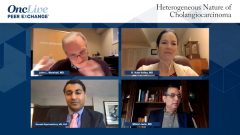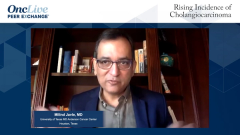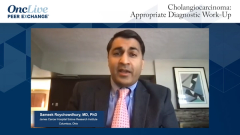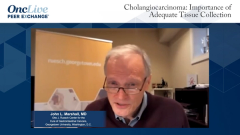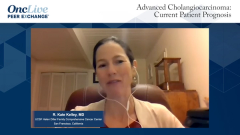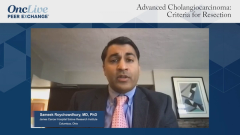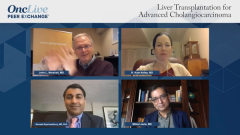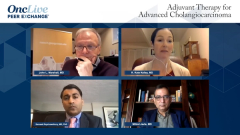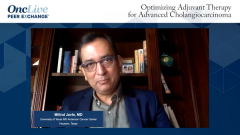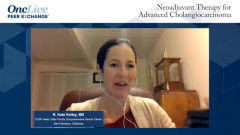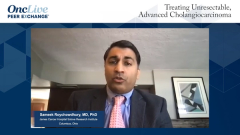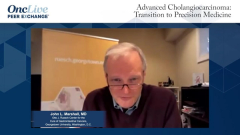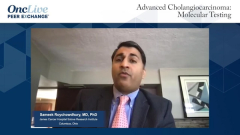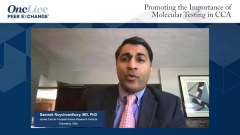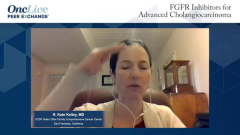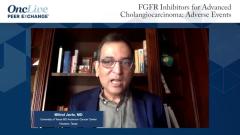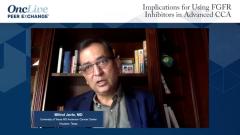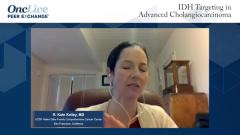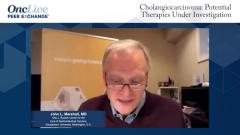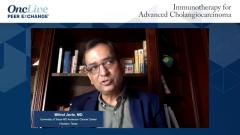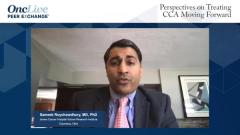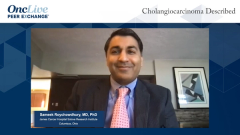
Immunotherapy for Advanced Cholangiocarcinoma
The role of MSI testing and potential use of immunotherapy to treat patients with advanced cholangiocarcinoma.
Episodes in this series

John L. Marshall, MD: Katie, what’s a talk about any kind of cancer without immunotherapy discussion? We talked earlier about how while they may have activity in an all-comer crowd, we know MSI [microsatellite instability] is present sometimes in these diseases. Are we making progress with immunotherapy in bile duct cancers?
R. Kate Kelley, MD: Progress, yes, but we don’t know yet what the role is outside of MSI-high or TMB-high [tumor mutational burden]. Again probably 5% or less have MSI-high cholangiocarcinomas. In the MSI-high patients, I think it’s important to emphasize again that these patients do extremely well with checkpoint inhibitors as monotherapy; from the KEYNOTE-028 and some of the basket trials, including the other KEYNOTE trials that enrolled MSI-high patients, we see that these patients have high rates of complete response and durability of response, sometimes exceeding multiple years. All of us in clinic now have patients with complete response that are off treatment who have been cancer-free for a while. I have a patient who has been cancer-free for 4 years now after participating in 1 of the KEYNOTE trials. For MSI-high, whether germline or somatic, I would use checkpoint inhibitors as monotherapy, even in first line if I knew that status at the time of starting therapy.
Now, 95% or more of our patients are outside of that context, and our data are much less encouraging for checkpoint inhibitors as monotherapy. I allude to the KEYNOTE-28 and KEYNOTE-158 trials, the largest multi-center, centrally reviewed groups of patients. KEYNOTE-158 in particular had adjudication of MSI status in nearly all of the patients. In that MSS [microsatellite stable] population of 100 patients, the response rate was 5.8%. Now, those 5.8% who did respond—we don’t know why they responded—have durable responses, but again, that was a minority of patients responding.
There’s slightly different data for nivolumab. Richard Kim and his team, in a multicenter study with a few centers, showed an objective response rate of approximately 11% when centrally reviewed; they were durable, real responses—better than the 5.8% but still close to the single digits. What we need to look for are ways to enhance that proportion of patients with response who have MSS cholangiocarcinoma.
John L. Marshall, MD: My bet is that all of us have a trial open right now doing just that. Dr Ruth He at our clinic is running one with a PARP inhibitor to see if we can wake up the cancer that way. I’ve seen radiation trials, and I’ve seen combination therapies. Everybody is trying. Outside of a marker, I have not been enthusiastic about trying I/O [immuno-oncology] therapy. Differences of opinion are appropriate here.
Milind Javle, MD: I think Katie stated it very well. In all these I/O studies, there’s a very rapid dip in survival, and then there’s a plateau. In our case, we have a plateau unlike many other cancers, so that’s good. It’s possible that some of these patients are not only being benefitted, but perhaps they’re being harmed because of this rapid dip. I’m looking forward to the data on the PD-1/TGF-β composite, bintrafusp alfa. It’s going to be the largest series—150 patients treated with I/O in biliary tract cancer. They should release that data by next ASCO [American Society of Clinical Oncology annual meeting] or ASCO GI [American Society of Clinical Oncology Gastrointestinal meeting]. There are several I/O plus combinations that are being studied, and we learn from them as well.
R. Kate Kelley, MD: With I/O plus chemotherapy, it’s always hard to flesh out what’s the effect of chemotherapy versus the combination with I/O, but we did see a pretty striking response rate from a study of durvalumab with or without tremelimumab plus GEM/CIS [gemcitabine/cisplatin] to date. That’s been underpinning for several first-line GEM/CIS plus checkpoint inhibitor versus GEM/CIS alone trials. It will be interesting to see if combining with a platinum or other cytotoxic prompts a better immune response.
John L. Marshall, MD: You make a good point, that we don’t understand what that mechanism is. We’re seeing it in gastric and other cancers. That seems to have some added benefit.
Sameek Roychowdhury, MD, PhD: I would like to add something about MSI and testing, just to advocate for MSI testing through next-generation sequencing. The reason is that the durability of response is so high; this is one of the mutations you never want to miss. IHC [immunohistochemistry], which is a traditional approach, only measures if the protein is not being expressed if you do the IHC for 4 genes. Now, a mutation could lead to a loss of the protein that you can detect by IHC, but a mutation could also affect the function of the protein and not the expression. The IHC is still present as the report says, but it could be a dysfunctional protein that leads to defects and mismatch repair and high TMB, which is a special kind of TMB. High TMB and MSI is really favoring the coding parts of the genome, the parts that help you recognize your tumor as foreign as opposed to UV [ultraviolet] light and tobacco damage, which damages everything. It’s a special hyper-mutation. Next-generation sequencing should be the preferred approach because there’s a few cases that are worth catching that could be missed by IHC.
John L. Marshall, MD: Never before have we had a molecular marker that’s so broadly defined. You can do it almost any way and get into these trials. If I’ve got an IHC that’s suggestive of MSI, I will go ahead and send the next-generation sequencing as a confirmatory. We’re getting next-generation sequencing on almost everybody, to be honest. The question is if a patient has got MSS in the adjuvant setting, do you send the tumor for next-generation sequencing to prove that one way or the other? I think that could be more controversial.
R. Kate Kelley, MD: The advantage is you can do a panel since you’ll want to be testing for other mutations anyway.
Milind Javle, MD: I want to add a caveat. With next-generation sequencing, you sometimes find some isolated MSH6 or something like that; MSI immunohistochemistry is negative, and the TMB is not really high. If you try hard enough, you can get I/O approved in that situation, but it’s still not clear whether a checkpoint inhibitor will be effective in that setting.
John L. Marshall, MD: Yeah, my enthusiasm would be low.
Sameek Roychowdhury, MD, PhD: There could be an example of an MSH2 mutation seen on an next-generation sequencing report, but if it’s not accompanied with high TMB, which the NGS test is also measuring now, they’re also directly measuring the microsatellite. Those 2 mechanisms are ones they can test for that help you properly classify as MSS versus MSI-high, but I think the TMB has to come along with the MSI-high status.
TRANSCRIPT EDITED FOR CLARITY


